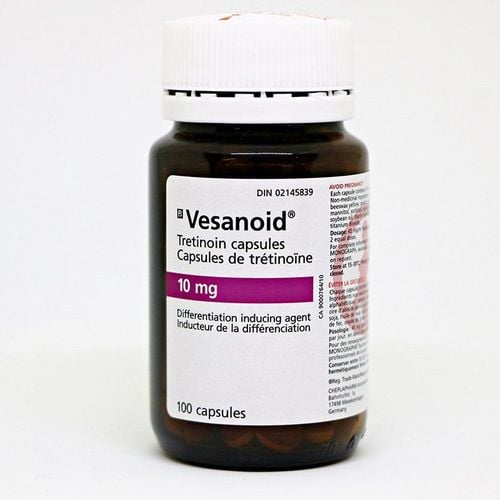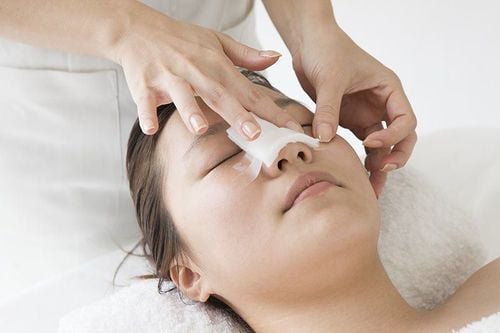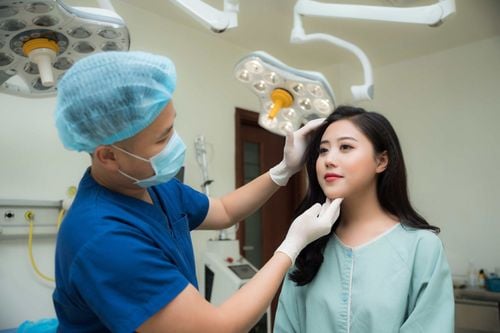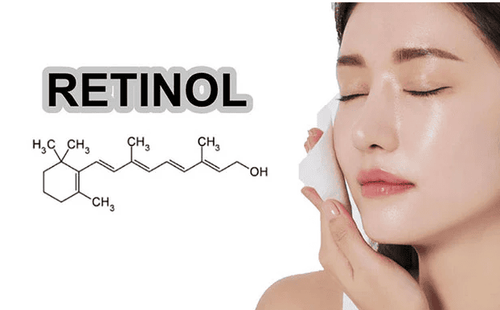This is an automatically translated article.
Retinoids are commonly used anti-aging compounds. It works to reduce fine lines and wrinkles by increasing collagen production, stimulating the production of new blood vessels in the skin to help improve skin tone. Other benefits include fading age spots and softening patches of rough skin,...
1. What are retinoids?
Retinoids are commonly used and widely studied anti-aging compounds. This vitamin A derivative is considered the gold standard for reducing wrinkles, crow's feet, enlarged pores and more. Tretinoin under the brand name Retin-A was the first retinoid. It was used as an acne treatment in the 1970s, but researchers later discovered that it also fades dark spots, stops activation, clears pigmentation, and speeds up turnover. surface skin cells.
Retinoids come in many varieties, some of which can be used without a prescription. In addition, some retinoids need to be used by a doctor's prescription. Prescription retinoids come in higher concentrations and may be more effective than OTC medications at reducing the appearance of wrinkles. This means they are also more likely to cause side effects. Some of the more readily available over-the-counter retinoids on the market include:
Body Merry Retinol Surge Moisturizer: a pharmaceutical product made with retinol and other types of antioxidants. This is a multi-purpose lotion that works to reduce the appearance of both fine lines and pores. Derma-E Anti-Wrinkle Regenerating Cream: This retinyl palmitate-based cream is suitable for dry skin that may show signs of premature aging. Besides, it can also help fight dull skin. Eva Naturals Skin Clearing Serum: Containing 2% retinol, this nightly serum can help smooth wrinkles, acne, and age spots. Other ingredients like 20% vitamin C and 2% salicylic acid to help reduce hyperpigmentation. Exuviance Super Retinol Concentrate: This nighttime gel contains retinol and citric acid, an anti-aging alpha hydroxy acid. Murad Resurgence Retinol Youth Renewal Night Cream: Ideal for drier skin, this retinol cream helps reduce wrinkles while improving skin tone. It also contains soothing peptides to reduce the risk of irritation. SEE ALSO: 13 "rumors" about Retinoids for better skin
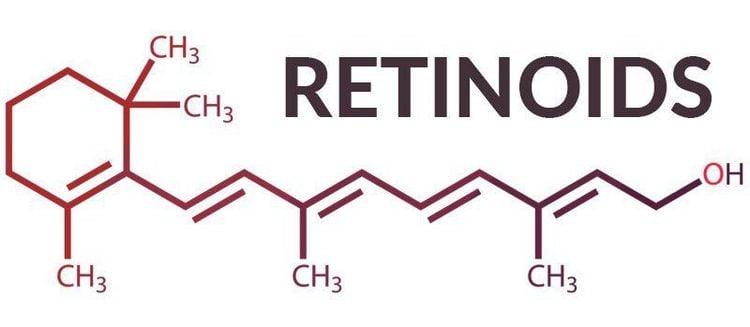
Retinoids là hợp chất chống lão hóa được sử dụng trong làm đẹp
2. How do retinoids work to reduce skin wrinkles?
Retinoids are made from derivatives of vitamin A. They work by neutralizing free radicals in the skin that can cause collagen damage. Collagen is one of the substances needed for youthful and healthy skin. As you age, your body begins to produce less collagen and elastin, and even breaks down collagen, elastin, and fat stores. This can cause the skin to thin and sag, leading to more wrinkles.
Retinoids reduce lines and wrinkles by increasing production, maintaining collagen reserves. They stimulate the production of new blood vessels in the skin, helping to improve skin tone. This can help fill or reduce the appearance of existing wrinkles and help prevent new ones from forming. In addition, other benefits that retinoids provide such as:
Reduce age spots, overall pigmentation Soften rough patches of skin Increase skin texture Reduce hydration levels
3. How to choose the right retinoids for your skin?
The main types of retinoids used in wrinkle reduction treatments are:
Retinyl palmitate: this is the least effective OTC retinoid. You may consider choosing this product if you have sensitive or very dry skin and few wrinkles. Retinaldehye: this is a slightly stronger OTC retinoid than retinyl palmitate. Retinol: is the most powerful ingredient found in OTC retinoid products. Tretinoin: is a powerful retinoid that is available by prescription only. Tazarotene: is the most potent of the retinoids and is available by prescription only. Formulated retinoids can also affect effectiveness, for example alcohol-based gels are considered the most effective of all formulations because they are readily absorbed by the skin. Besides, these products are also suitable for acne-prone skin. If you have drier or more mature skin, it may also work better to use cream retinoids.
MORE: Retinol for acne: How to use it safely, side effects
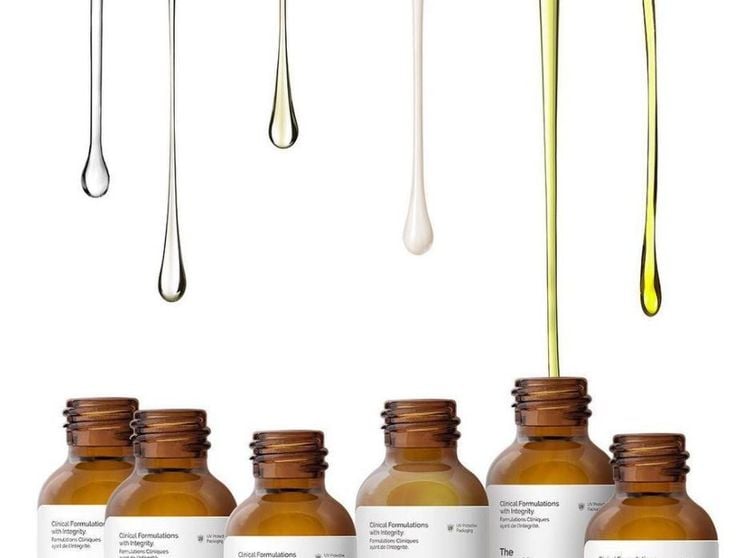
Người dùng cần lựa chọn loại retinoids phù hợp với làn da
4. How to use retinoids in your skin care routine
Before using retinoids, check if your skin has an allergic reaction to the product by doing the following:
Apply a small amount of the product to the skin surface of the forearm. Cover the area and watch for 24 hours If you start to experience irritation or inflammation do not use this product. Conversely, if you do not experience any symptoms within 24 hours, the product can be used. Use retinoids every night before bed. After cleansing and nourishing your skin daily, apply retinoids to the surface of your skin before applying your nighttime moisturizer. Retinoids are only used at night because they are intense and sensitive to UV rays. Make sure that you regularly use sunscreen during the day to reduce the risk of side effects.
5. Undesirable effects when using retinoids
One side effect of using retinoids is irritation and dryness, especially when you first start using the product. Besides, you are also more likely to experience side effects if you use multiple anti-aging products at the same time. So, before using the product, check for an allergic reaction and use the product after 2-3 weeks of stopping the old product so that the skin has time to regenerate. To reduce the risk of side effects, you can use a product with a lower concentration of retinoids and gradually increase the concentration as needed.
Sunburn is another possible side effect of using retinoids. Over time, you may also be at risk for the appearance of age spots. To reduce unwanted effects, apply a broad-spectrum sunscreen daily. Also, do not use retinoids in pregnant or nursing women.
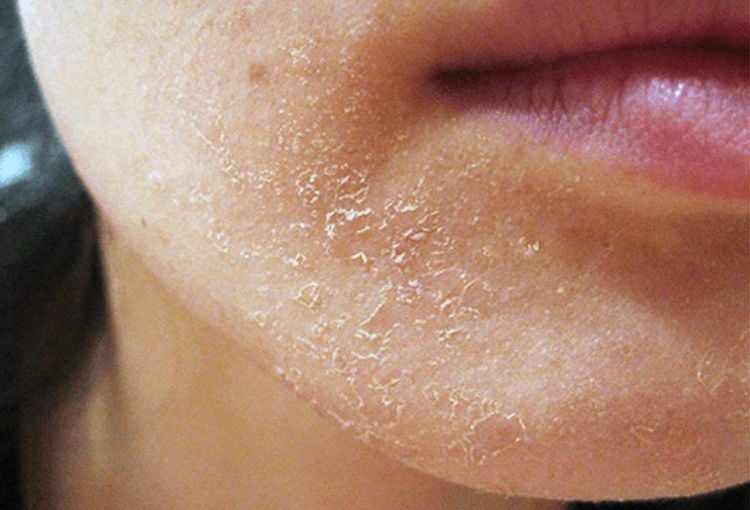
Một số ít trường hợp bị khô da khi sử dụng retinoids
In short, retinoids are anti-aging products that work to reduce fine lines and wrinkles by increasing collagen production, stimulating the production of new blood vessels in the skin to help improve skin tone. However, it may take up to 6 months for you to see results. In addition, retinoids can cause some unwanted effects, so before using you should consult a dermatologist for a suitable wrinkle reduction treatment.
Please dial HOTLINE for more information or register for an appointment HERE. Download MyVinmec app to make appointments faster and to manage your bookings easily.
References: health.harvard.edu, healthline.com




